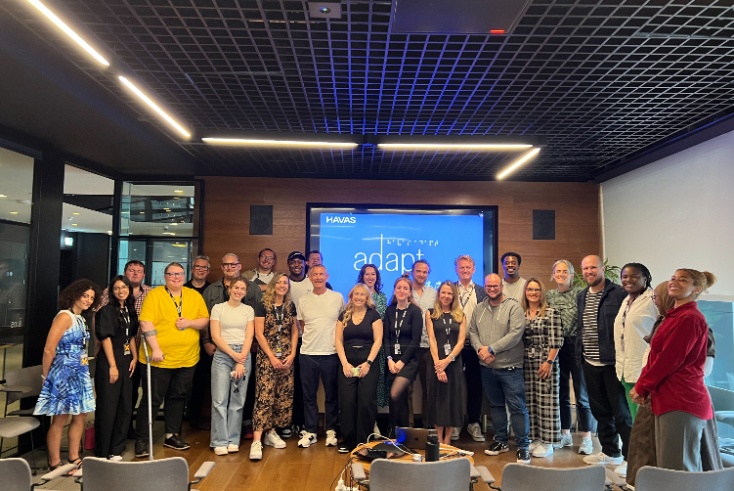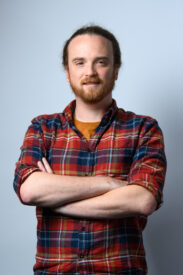Disability is all around us: but do you see it?

Opinion
Media and advertising needs to change the conversation around disability — not only within the industry but beyond so people do not ‘slip’ into exclusive environments.
Around a fifth of the world’s population lives with some disability — physical or neurological, or invisible or visible. Nearly five million people in the UK are carers too. That’s around twenty million people in the UK (nearly a third) who are impacted directly by disability.
Now ask yourself this: who in my team is disabled or a carer? How confident are you in your answer?
I should imagine not very confident (although if you are, kudos). That means one of two things: either our industry isn’t employing people living with disability or people living with disability aren’t sharing this personal information with you.
This was partially revealed in the latest All In Census in which 11% of respondents declared a disability — half the national average, sure, but still far from representative of the wider population. From conversations with friends, family, acquaintances, it’s a familiar story in other industries too and often worse.
We must change the conversation around disability within our industry and I believe as experts in changing conversations through our work in communications and advertising, we have power to influence the conversation outside of our industry too.
Disability can still be a taboo in the workplace
Nearly a decade ago I woke up unable to walk; I was bed-bound for around three months and it took many more years of rehabilitation before I was able to live a life as close to normal as possible. Last year I completed my first triathlon — an Olympic one, no less — such is the journey I’ve been on. For all intents and purposes, I’ve recovered — and I am lucky to have done.
This experience over the past decade has shaped my understanding of how disability can be a taboo in the workplace and how we’ve designed a world that’s inherently exclusive for those who don’t fit — the office chairs that aggravate chronic pain, the loss of social contact because you can’t go out, the need to ask colleagues to put shoes on your feet (as in my case), the countless hospital appointments that add pressure to your already-hectic day job.
I also learnt how easy and quick it is to slip into an exclusive environment because of disability. During the first lockdown of the pandemic, I caught up with a distressed colleague who explained she relies on lip-reading and couldn’t participate in meetings because video cameras were turned off. Just like that, she’d gone from an inclusive to an exclusive working environment overnight.
I can’t help but feel it’s not a coincidence that the moment I stopped being open about the two-year gap in my employment record (as recommended by friends eight years ago) that I managed to secure a job within three weeks. (Incidentally, I’ve been the most open about this at Havas).
I’m determined that no-one else should feel like they don’t or can’t fit into the workplace no matter whether temporarily or permanently. And that we see the tremendous contribution people with disabilities can bring to any team and organisation — whether a workstream right through to team culture.
Since speaking out more, it’s been enlightening to learn just how many people are affected by disability and it’s encouraging how much support there is out there when you do – including from senior people in our industry, as we’ve found at Havas.
Last week, we launched Havas Adapt –— our first employee disability network and in partnership with StudioCanal, our fellow Vivendi business. We’ve chosen the word Adapt as it reframes the relationship society has with disability; that it adapts to someone’s needs rather than the person adapting to society’s design.
We’ve chosen the colour purple to align us with the global disability movement that’s far greater than us, our industry or the business community.
Working closely with our DE&I team, our 10 Point Charter and other employee groups emb[race], Havas Pride and Women of Havas, we’re determined Havas Adapt will be the most ambitious it can be and empowering to those who use it and need it.
Along with aspirations to becoming certified ‘Disability Confident’ Leaders, we’re already underway by working with Leonard Cheshire Change 100 programme and partnering with leading disability charity Purple Tuesday. This is just the beginning.
Positive signs of change
Elsewhere, there are some encouraging signs our industry is coming together, fuelled by a need to change the conversation around disability in our industry and beyond.
This year I attended the IPA’s Talent & Diversity Conference where disability had its own section and slide — which I believe is the first-time disability received its own limelight.
Meanwhile at Havas, we’re also starting to see improved disability representation in the work we deliver for clients — Havas London’s Channel 4 Diversity in Advertising award-winning campaign for Vanish, ‘ Me, My Autism & I’, as well as Havas Play’s work ‘new signing’ for EE.
Media can also follow suit by, for example, making digital accessibility a cornerstone of their operations.
Each and every one of us will be affected by disability in some way at some point in our lives. If we all come together to change a little, together we can change a lot.
Before we can embark on that journey, we need to change the conversation. Because someone in your team has been touched by disability and the chances are you don’t know about it.
 Michael Phillips is communications director at Havas Media Network UK and co-chairs Havas Adapt, a new employee disability network.
Michael Phillips is communications director at Havas Media Network UK and co-chairs Havas Adapt, a new employee disability network.




